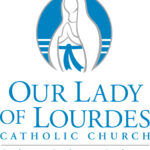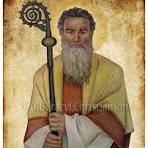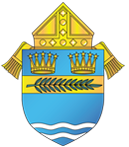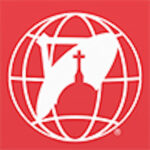Additional resources to help you on your journey of Faith
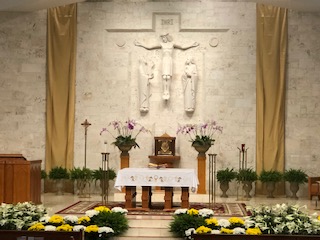
Altar Flowers Offered
In Memory of
Mr. & Mrs. Joseph Lichodolik
![]()
Requested by
Son, Robert
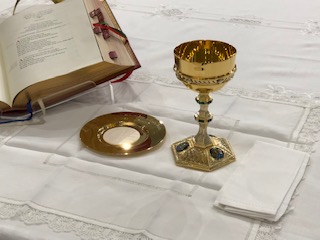
Altar Bread Offered
For
Eugene Connolly & Robert Colby
![]()
Requested by
The Colby Family
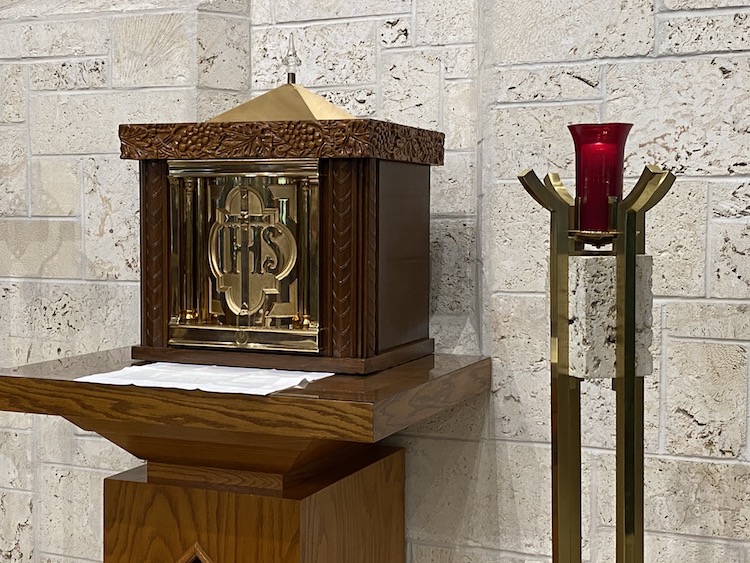
Sanctuary Lamp Offered
In Memory of
Richard Ciuzio
![]()
Requested by
Loving Wife, Ingeborg
CLICK BUTTONS BELOW TO ACCESS SECTIONS
MASS READINGS AND VIDEO REFLECTION
Seventeenth Sunday of Ordinary Time - Cycle B
God's Abundance Shared To Us
God’s abundant life and blessings are shared to us, enabling us to share the same abundance to others. God is abundant in His patience, love, mercy, and care for us, so too, we are to be abundant in mercy, love, and patience towards others. This leads to creating and sustaining harmony with everyone. Let us always recognize that God is the source of everything we have. In doing so, there will be more blessings to us. Let us grow in our devotion to the Eucharist where we receive the abundant life and blessings of God.
Monday
Tuesday
Wednesday
Thursday
Friday
Saturday
Sunday
Jer. 13:1-11/Ps 32:18-21/Jn 11:19-27
Jer. 14:17-22/Ps 79:8-13/Mt 13:36-43
Jer. 15:10, 16-21/Ps 59:2-18/Mt 13:44-46
Jer. 18:1-6/Ps 146:1b-6ab/Mt 13:47-53
Jer. 26:1-9/Ps 69:5, 8-10, 14/Mt 13:54-58
Jer. 26:11-16,24/Ps 69:15-16,30-34/Mt 14:1-12
Ex. 16:2-4, 12-15/Ps 78:3-4, 23-25, 54/Eph 4:17, 20-24/Jn 6:24-35
FAITH FORMATION
Our ministry aims to help the faithful adult to grow in both Human and Christian maturity.
As part of this goal we offer links to Adult Faith Formation videos.
From a Treatise on the Lord’s Prayer
Saint Cyprian’s Treatise on the Lord’s Prayer offers a deep reflection on Christian identity, divine grace, and moral duty, emphasizing the profound impact of recognizing God as “Father.” This work explores how this relationship shapes believers’ lives, urging them to live out their faith authentically in both spiritual devotion and daily actions. It highlights the prayer’s role in guiding Christians to align closely with God’s will, merging grace with moral responsibility.
This week, Saint Cyprian reflects on the petition “Give Us This Day Our Daily Bread.”
In the petition, “Give Us This Day Our Daily Bread,” Saint Cyprian elucidates that this request carries spiritual and literal significance, essential for our salvation. On a spiritual level, Christ is the “Bread of Life,” as declared in John 6:48. This bread is described not as a universal offering but as specifically ours, emphasizing the personal connection believers have with Christ. Cyprian argues that just as we say “Our Father,” reflecting our relationship with God, we similarly call Christ our Bread because he sustains those who partake of His Body through the Eucharist. To support this, Cyprian quotes from John: “I am the living bread that came down from heaven; whoever eats this bread will live forever; and the bread that I will give is my flesh for the life of the world (Jn. 6:51).” He further cites the need to partake of this bread: “Unless you eat the flesh of the Son of Man and drink his blood, you do not have life within you (Jn. 6:53),” illustrating the necessity of the Eucharist in maintaining our spiritual life.
On the literal level, this prayer acknowledges our daily need for physical sustenance, which aligns with Jesus’ teachings. He instructed his followers, “Everyone of you who does not renounce all his possessions cannot be my disciple (Lk. 14:33).” This call for faith and dedication to Christ is echoed in Matthew, where Jesus advises, “Therefore do not worry about tomorrow, for tomorrow will worry about itself. Each day has enough trouble of its own (Mt. 6:34).” Cyprian connects these teachings to the Apostle Paul’s exhortation where he outlines the spiritual dangers of wealth: “We brought nothing into the world, and we can take nothing out of it. But if we have food and clothing, we will be content with that. Those who want to get rich fall into temptation and a trap and into many foolish and harmful desires that plunge people into ruin and destruction. For the love of money is a root of all kinds of evil. Some people, eager for money, have wandered from the faith and pierced themselves with many griefs (1 Tim. 6:7-10).”
Cyprian also references the parable of the rich fool where God admonishes, “You fool! This very night your life will be demanded from you. Then who will get what you have prepared for yourself (Lk. 12:20)?” This parable serves as a caution against the transient nature of earthly possessions. Christ’s teachings on true riches are encapsulated in the following verse from Matthew, “If you want to be perfect, go, sell your possessions and give to the poor, and you will have treasure in heaven. Then come, follow me (Mt. 19:21).”
He further illustrates God’s provision for the just with biblical assurances such as, “The LORD does not let the righteous go hungry (Prov. 10:3),” and, “I was young and now I am old, yet I have never seen the righteous forsaken or their children begging bread (Ps. 37:25).” These promises are reiterated by Jesus in Matthew; “So do not worry, saying, ‘What shall we eat?’ or ‘What shall we drink?’ or ‘What shall we wear?’ For the pagans run after all these things, and your heavenly Father knows that you need them. But seek first his kingdom and his righteousness, and all these things will be given to you as well (Mt. 6:31-33).”
Lastly, Cyprian cites Old Testament examples of divine providence such as Daniel, nourished in the lions’ den, and Elijah, sustained by ravens, referenced in 1 Kings 17:4-6, showing that God’s care extends to those in dire circumstances, further reinforcing trust in God’s enduring provision.
.
Click HERE for an English translation of the original document
The current norm regarding fasting before communion is Canon No. 919:
§1. A person who is to receive the Most Holy Eucharist is to abstain for at least one hour before holy communion from any food and drink, except for only water and medicine.
§3. The elderly, the infirm, and those who care for them can receive the Most Holy Eucharist even if they have eaten something within the preceding hour.
The calendar is based upon the General Roman Calendar, promulgated by Pope Saint Paul VI on February 14, 1969, subsequently amended by the Holy See, and the Proper Calendar for the Dioceses of the United States of America, approved by the USCCB and confirmed in 2010 by the Congregation for Divine Worship and the Discipline of the Sacraments.
ARE YOU AN ACTIVE PARISHIONER?
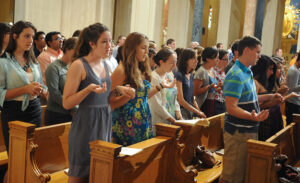
A Parish is not simply a “branch office” of the Church, nor a periodic audience of people, nor an occasional public; but it is a formally organized social group. It is a portion of a Diocese under the authority of a Priest legitimately appointed to secure in virtue of his office for the faithful dwelling therein, the helps of religion.
The faithful are called parishioners, and they become parishioners by acquiring a domicile or a quasi-domicile within the geographical boundaries or territory of the Parish.
Parishioners could be active parishioners or non-active parishioners, and the question of parishioner status is important because parishioners look to their Parish for many services such as:
- Parishioner tuition rates in our Catholic schools;
- The use of our facilities for liturgical services such as baptisms, weddings and funerals;
- And certification as eligible sponsors at Sacramental celebrations.
These rights and services within the church bring with them certain obligations, as in any form of community.
To be considered “active,” a parishioners must be:
- Registered in the parish;
- Attend Mass faithfully;
- Support the life of the parish by sharing time and talents in service;
- And sharing treasure (tithing) to build up the community.
Active participation in Christian Stewardship makes you an ACTIVE parishioner.
DONATIONS

Donate To Parish
Our Parish is sustained through the Generosity Of Parishioners And anyone of goodwill.

Donate A Lasting Legacy
A Bequest is a unique gift of money or assets left through your will and is an investment in the future of your Parish.
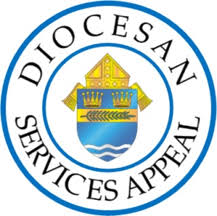
Donate To DSA Campaign
Each Parish has the responsibility to support the needs and ministries of the Diocese.
